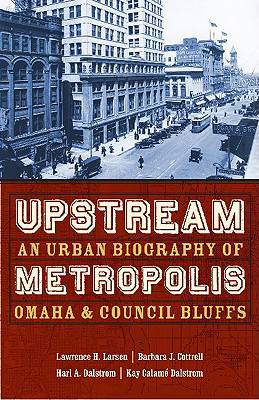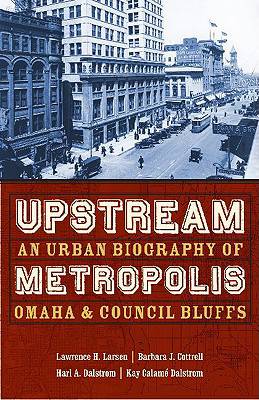
- Afhalen na 1 uur in een winkel met voorraad
- Gratis thuislevering in België vanaf € 30
- Ruim aanbod met 7 miljoen producten
- Afhalen na 1 uur in een winkel met voorraad
- Gratis thuislevering in België vanaf € 30
- Ruim aanbod met 7 miljoen producten
Zoeken
Upstream Metropolis
Lawrence Harold Larsen, Harl A Dalstrom, Kay Calame Dalstrom, Barbara J Cottrell Larson
€ 34,95
+ 69 punten
Omschrijving
From its birth as interdependent towns on the Missouri River frontier to its emergence as a metropolis straddling two states, Omaha-Council Bluffs has been one of the great urban construction projects in the nation's history. Upstream Metropolis provides the first comprehensive history of this unique urban region that ranks 60th among the 370 major metropolitan areas in the United States. Drawing on local newspapers and historical archives, the authors deliver an anecdote-rich account of how and why a large metropolitan area developed in this spot. They also explain why it grew so big--and no bigger--but could never have remained two small towns. Upstream Metropolis is an urban biography of the highest order, tracing the lives of two cities, which though divided by a river, the problems of a state line, and inevitable rivalry, have always been inextricably linked. This discussion moves from the freewheeling frontier days to the times of farming and railroads, examining influences such as the populist movement, the meatpacking industry, immigration, and ethnicity. The highly readable result is a pioneering contribution to the history of urbanization in America.
Specificaties
Betrokkenen
- Auteur(s):
- Uitgeverij:
Inhoud
- Aantal bladzijden:
- 496
- Taal:
- Engels
- Reeks:
Eigenschappen
- Productcode (EAN):
- 9780803280021
- Verschijningsdatum:
- 1/06/2007
- Uitvoering:
- Paperback
- Formaat:
- Trade paperback (VS)
- Afmetingen:
- 225 mm x 164 mm
- Gewicht:
- 693 g

Alleen bij Standaard Boekhandel
+ 69 punten op je klantenkaart van Standaard Boekhandel
Beoordelingen
We publiceren alleen reviews die voldoen aan de voorwaarden voor reviews. Bekijk onze voorwaarden voor reviews.







